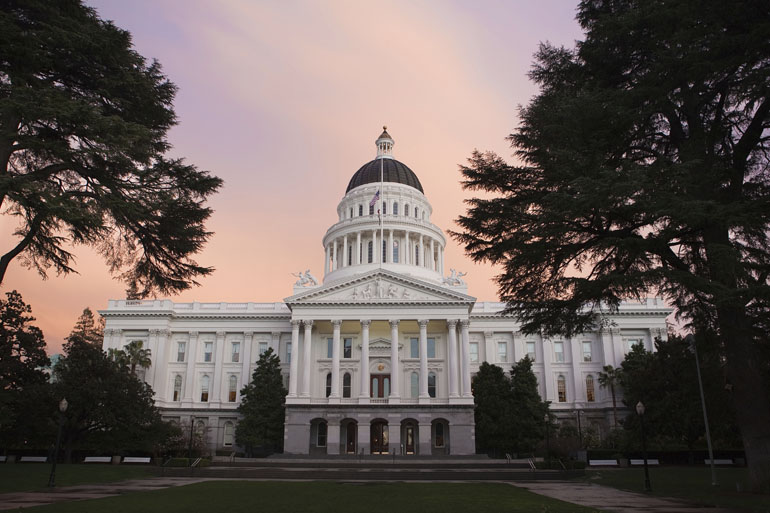A plan to offer full state-sponsored health benefits for adult immigrants without papers is likely to spark one of the biggest political fights of the year in Sacramento.
Sen. Ricardo Lara, D-Bell Gardens, introduced a bill last year to extend full Medi-Cal benefits to everyone living in California, regardless of immigration status. The scope of that bill was narrowed to cover only children, and it is now law.
An estimated 240,000 undocumented kids will become eligible in May for full coverage through Medi-Cal, California’s version of Medicaid, which provides health care for people with low incomes.
Sen. Ricardo Lara, D-Bell Gardens (Courtesy Sen. Lara’s office)
The next step, Lara believes, is to extend that coverage to 1.2 million adult immigrants living in California without legal documents and without health insurance.
Covering kids without papers is one thing, but providing the same benefits to adults, who vastly outnumber the children, is a far more expensive — and contentious — proposition.
Some critics point to the cost — hundreds of millions of dollars. Others say it is simply wrong to spend tax dollars on people who, they say, have no right to be here.
Proponents say unauthorized immigrants are part of the state’s economic fabric and it benefits no one if they are sick.
“There’s a lot of momentum right now for this, it will definitely be at the forefront this year,” said Jesse Melgar, a spokesman for Lara.
Cost is the big issue, said Lucien Wulsin, executive director of the Santa Monica-based Insure the Uninsured Project. Initial estimates have ranged widely: The UC Berkeley Labor Center estimates $350 million a year while an Assembly analysis says it could hit $740 million.
“The governor has said, ‘show me the financing.’ That piece is huge,” Wulsin said. “I don’t know that anyone has solved it yet, and everybody thinks it has to be solved for this to move forward.”
Melgar said Lara wants to wait for the Senate budget analysis before targeting specific funding sources. “Right now it’s premature to discuss cost estimates,” he said.
Melgar noted that Gov. Brown “strongly supported” Medi-Cal coverage for the children, and said Lara hopes to work out a plan with the governor’s office to pay for the adults.
For some people, money is not the main issue.
No matter the price tag, it’s not how we should be spending our tax dollars, said Jon Coupal, president of the Howard Jarvis Taxpayers Association.
“I think it’s horrible policy” and it would be “a magnet for more of the undocumented to come to this state,” Coupal said. “I think it’s hard to look taxpayers in the eye and say you want to provide medical care for people who don’t have a legal right to be here. It’s just not fair.”
But immigrants, including those here illegally, are a workforce reality in California, said Laurel Lucia, health care program manager at the U.C. Berkeley Labor Center.
She said that immigrants without papers constitute about 9 percent of the state’s workforce, “and having a healthy workforce is important to all of us.”
Lucia noted that of the estimated 1.2 million immigrants in California who are undocumented and uninsured, roughly 870,000 receive federally funded emergency services.
The initial costs of full Medi-Cal coverage, she said, could be a little lower than expected because of the emergency care those immigrants receive. If people get no care at all, they tend to have more untreated conditions that can drive up the cost of treating them later, she explained.
Coverage of adults, Lucia added, could also lead to better coverage for children, since many eligible kids in families of mixed-immigration status go without care.
“About three-quarters of the households headed by an undocumented adult have a citizen in the family, and often a citizen child,” she said. “The whole family might not sign up for coverage, even if they’re eligible.”
The demographics of those targeted by Lara’s plan could make Medi-Cal coverage less expensive than average, Wulsin said: “That population tends to be a younger, low-using population.”
A political wild card could dramatically shift the conversation: the status of President Obama’s executive order granting temporary work permits and a reprieve from deportation to 5 million unlawfully present immigrants across the country.
A federal district court suspended the order, and the Supreme Court is expected to hear the case this spring. If it’s allowed to take effect, the cost of Lara’s proposal could go down. With work permits in hand, many adults who are here without official immigration papers would get better jobs and could afford their own insurance, or get it through employers.
In Sacramento, the powerful Latino caucus sets its policy agenda at the start of April. How high the issue lands on that list will help determine its fate this year.
Melgar noted that the caucus made health coverage for the undocumented its top priority last year.
